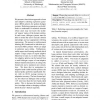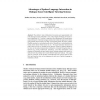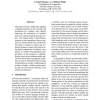36 search results - page 3 / 8 » Learning with noisy supervision for Spoken Language Understa... |
128
click to vote
ACL
2010
14 years 11 months ago
2010
We present a data-driven approach to learn user-adaptive referring expression generation (REG) policies for spoken dialogue systems. Referring expressions can be difficult to unde...
119
click to vote
ACL
2011
14 years 5 months ago
2011
Information extraction (IE) holds the promise of generating a large-scale knowledge base from the Web’s natural language text. Knowledge-based weak supervision, using structured...
137
click to vote
ITS
2004
Springer
15 years 6 months ago
2004
Springer
Abstract. The ability to lead collaborative discussions and appropriately scaffold learning has been identified as one of the central advantages of human tutorial interaction [6]. ...
137
click to vote
AAAI
2012
13 years 3 months ago
2012
Twitter sentiment analysis (TSA) has become a hot research topic in recent years. The goal of this task is to discover the attitude or opinion of the tweets, which is typically fo...
ACL
2006
15 years 2 months ago
2006
This paper presents a method for adapting a language generator to the strengths and weaknesses of a synthetic voice, thereby improving the naturalness of synthetic speech in a spo...



